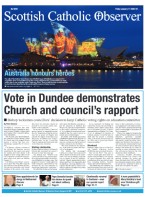January 10 | ![]() 0 COMMENTS
0 COMMENTS ![]() print
print

Julius Nyerere: African saint or socialist sinner?
Assessing a politician’s life often requires looking again at the contradictions they tried to resolve, finds Ross Ahlfeld as he remembers Tanzania’s first president Julius Nyerere
There are only really three essential components to create the perfect conditions for an edifying pilgrimage—an interesting destination, a decent packed lunch and a right good read for the train.
Ideally, your book should be a devotional or a breviary of some kind, especially if you are travelling to a location of some spiritual significance.
Having all three of these ducks in a row, I recently set out for Edinburgh, munching on a pork luncheon meat sandwich, drinking sugary tea from a flask while reading the new St Gregory’s Prayer Book, recently compiled by Ignatius Press for the Anglican Ordinariates established by Pope Benedict XVI back in 2010.
This beautiful little prayer book draws on the riches of Anglican liturgical heritage, using the exquisite Cranmerian language of the Book of Common Prayer to further enrich the panoply of our Catholic liturgy and devotion.
Texts
The text includes ancient English collects, introits, devotions and the Old Sarum prayers all in one prayer book, approved as Catholic liturgy.
At the time some Anglicans felt that Benedict’s 2011 Anglicanorum Coetibus which led to the creation of the Ordinariate of Our Lady of Walsingham, was somewhat predatory and opportunistic.
Hopefully, they’d now perhaps take comfort in the new St Gregory’s Prayer Book, representing what Emeritus Pope Benedict called the Anglican patrimony within the Catholic Church.
Mind you, the uptake turned out to be tiny and rather than assimilating vast swathes of Anglicans into the Church, the unexpected result of the Ordinariate has been to expose cradle RCs to the beauty of the Anglican tradition.
Certainly, the Ordinariate has been positive for the increase in unity and understanding between Catholics and Anglicans and, for me, this gift should be treasured by all Catholics.
‘Sacramental Socialism’
We should perhaps also embrace the noteworthy expression of political thought known as ‘Sacramental Socialism’ associated with Anglo-Catholicism, which also came to prominence as the Church of England began to rediscover Catholic worship in the 19th century.
Anglo Catholic Socialism (or Sacramental Socialism) came into being because the Anglican hierarchy remained unimpressed with the emergence of seemingly pro-Roman Anglo-Catholics. The so-called Tractarians were organised around the Oxford movement associated with St John Henry Newman during the Victorian era before he entered the Catholic Church.
At the time, the fullness of Catholic worship was not considered to be respectable by the Anglican establishment. As such, many Anglo-Catholic priests were dispatched to the industrial slums where they developed a strong sense of social justice and empathy for the working classes to whom they ministered.
The Sacramental Socialists were also influenced by St John Chrysostom who drew on the connection between the real presence of Christ in the Blessed Sacrament and his real presence in the poor and oppressed.
Liberation Theology
Even so, long before the emergence of ideas such as Liberation Theology within the Catholic Church, such a blatant embrace of the term ‘socialism’ by Anglican clergy was problematic for Victorian Catholics. This was despite the very ‘Socialistic’ Cardinal Manning and the existence of Catholic Socialist Societies in Glasgow at the time.
This conflict was exacerbated by Papal Encyclicals which consistently and explicitly condemned the apparent Godless materialism of socialism.
Yet, how do we define Socialism in the 21st century? Do we think of the worst excesses of atheistic totalitarian Communism or the nationalisation, comprehensive education system, NHS and Welfare State associated with the ‘New Jerusalem’ built by Clement Attlee’s 1945 post-war Government?
None of these Labour policies contradicted anything contained in Catholic Social Teaching and even Emeritus Pope Benedict wrote: “In many respects, democratic socialism was and is close to Catholic social doctrine and has in any case made a remarkable contribution to the formation of a social consciousness.”
Julius Nyerere
With all these conflicting ideas and thoughts running through my head, I arrived in Edinburgh, my place of pilgrimage, following in the footsteps of the great Julius Nyerere.
Nyerere was a devout and deeply religious Tanzanian politician who served as the first leader of post-colonial Tanzania after the east African country’s independence, from 1960 until 1985. Nyerere lived here in Edinburgh from 1949 to 1952 and his time in Auld Reekie provides the opportunity to walk from his home in The Grange to Edinburgh University where he studied.
The University of Edinburgh is rightly proud of its connection with Nyerere and today its Centre for African Studies offers scholarships to young Tanzanians to honour the memory of Tanzania’s first President.
From the university, you can then head to St Mary’s Cathedral where Nyerere liked to attend daily Mass; Julius was a daily communicant and remained so for the rest of his life. He was also known for his active prayer life and frequent fasting. In 2006, the cause for his Beatification was opened with Vatican approval and Nyerere has since been given the title ‘Servant of God.’
Admiration
This is perhaps why I admire Nyerere, a politician and a layman, so much. My late grandfather became a daily communicant after he retired, as is my father today and, if God spares me, as I will be one day, too.
Unfortunately, by the time I arrived at St Mary’s it was the afternoon and I’d missed morning Mass. However, according to his biography, Nyerere also liked to sit in the silence of the cathedral at quiet times, just as I was able to do.
I first learned about Nyerere’s political philosophy from a book given to me by a community worker friend who’d studied Nyerere’s policy of Ujamaa while he was a student. Ujamaa was Nyerere’s own blend of African Catholic Socialism, which emphasised family, community, fraternity, self-reliance, and local production.
The hope was that Tanzania could apply Ujamaa to its rural agriculture to ‘decolonise’ itself and win independence peacefully, in contrast to the violent transitions taking place in other new African states. Most historians and Tanzanians agree that the collective farming plan of Ujamaa was an economic disaster which resulted in further hardship; the country remained extremely poor, hugely in debt and massively reliant on foreign aid to prevent starvation.
Improvements
However, there were major improvements in healthcare and education, literacy rates and access to clean water. It should also be noted that the difficulties faced by Tanzania must be seen in the context of the crippling disadvantages faced by African nations freeing themselves from centuries of colonialism.
Moreover, while the aforementioned late 19th and early 20th century Sacramental Socialists struggled with how Catholics might better relate to the emergence of socialism, Nyerere attempted to combine Catholic social teaching with socialist economics in the context of a traditional African society.
Yet, it seems that the more things change the more they stay the same, even today we still procrastinate about our Corbynista generation, born after the Cold War with no memory of the misery of the Soviet Union, rushing to embrace the flaws of Marxism again.
Regardless, during this pontificate of Francis, Catholic Socialists are once again looking to the vibrant Church in Africa. Similarly, we are now seeing an increase in radical 20th century lay-people like Nyerere being considered for canonisation, Dorothy Day and Franz Jagetstatter being two others.
Canonisation
However, before European Catholics can fully embrace and promote the cause for Nyerere’s canonisation, we should first listen to Catholics and non-Catholics in Tanzania, as to fully understand Nyerere’s complex reputation as the Father of the Nation, alongside the legacy of his one-party state and unsuccessful socialist reforms.
Although admired for his idealism and personal integrity, Nyerere left a mixed political legacy and his cause for sainthood has been initiated because of the way he conducted his public life as a politician, thinker and writer.
For us to simply appropriate Nyerere for our own political ends within the context of the western Church’s ongoing ‘conservatives v liberals’ culture war, without being guided by, and informed by our brothers and sisters in Africa, would be to simply indulge in another act of neo-colonialism rather than solidarity.
What we can perhaps agree on is that all our well intentioned political activism must always have its roots in a meaningful prayer life, this was true for both Julius Nyerere and the Victorian Sacramental Socialists, and it’s true for us today also.
Our desire for justice and peace flows from our sacramental life, as it says in the St Gregory prayer book “He has not created me for naught, I shall do good, I shall do his work.”










